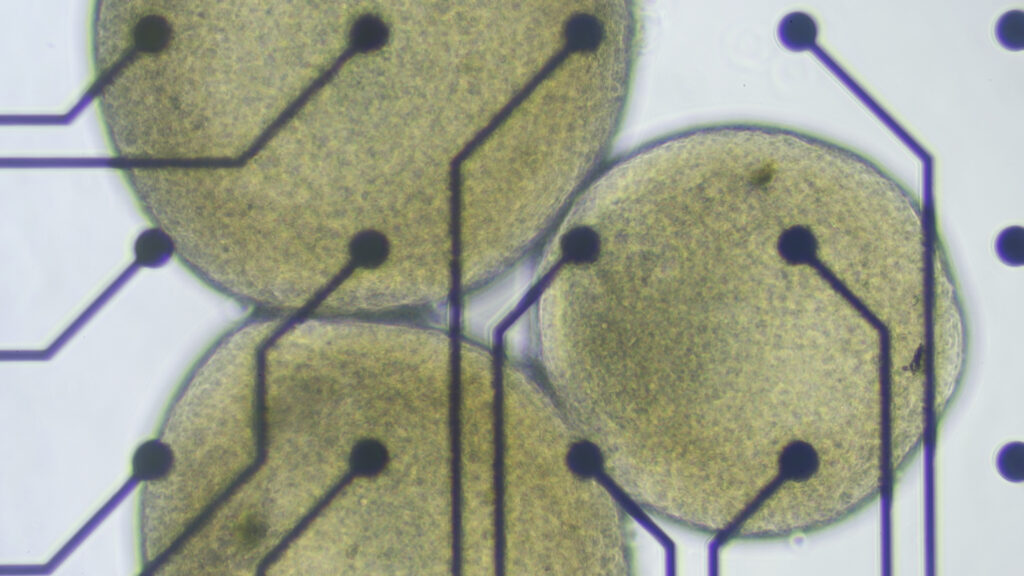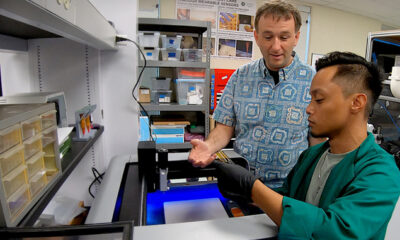Science
Researchers Warn Against Overstated Claims in Organoid Intelligence

Recent discussions among leading researchers in the field of brain organoids have raised concerns regarding exaggerated claims about the potential of organoid intelligence. This emerging area of study, which explores the capabilities of lab-grown brain tissue, has gained momentum thanks to significant investments from organizations like the National Science Foundation and DARPA. However, experts caution that inflated representations may lead to misunderstandings that could ultimately hinder scientific progress.
At a recent meeting at the Asilomar conference center in California, scientists, ethicists, and legal experts convened to address the ethical implications surrounding human neural organoids. These organoids, which are tiny clusters of human brain cells, are cultivated for research on psychiatric and neurodevelopmental disorders. The gathering highlighted the need for clear definitions and ethical guidelines as the field evolves.
In the lab of Lena Smirnova at Johns Hopkins University, brain organoids undergo a transformation from bioreactors to silicon chips embedded with microelectrodes. This process facilitates the study of how these miniaturized brain models communicate and respond to various stimuli. Smirnova, along with her collaborator Thomas Hartung, has introduced the concept of “organoid intelligence,” proposing that these models could one day mimic certain cognitive functions of the human brain.
Despite advancements, skepticism remains prevalent. Sergiu Pasca, a neural organoid researcher at Stanford University, expressed concerns about the potential backlash from the public due to sensationalized claims. He emphasized the importance of using precise language to convey the actual capabilities of these systems. “Using accurate terms that neither hype nor misrepresent the work really does matter,” he remarked.
The distinction between organoid intelligence and true consciousness is critical. While entities like honeybees exhibit problem-solving abilities and social organization, the threshold for sentience in lab-cultured tissues is murky. Tony Zador, a computational neuroscientist at Cold Spring Harbor Laboratory, described attempts to equate organoid intelligence with silicon-based AI as misguided, arguing that the intricacies of neural circuitry are far from being understood.
Compounding these concerns is the fear that exaggerated claims may lead to restrictive regulations. Madeline Lancaster, who pioneered brain organoids at the University of Cambridge, warned that overly broad laws could stifle beneficial research aimed at improving human health. “That could bring in regulations that prevent all work, including on the side of the field that’s really doing research to try to help people,” she noted.
Smirnova’s lab has focused on examining how environmental toxins affect brain development. By studying how harmful substances impact neuronal connections, they aim to provide insights into conditions like autism. Neural organoids have shown promise, but for them to replace animal testing, they must demonstrate behavioral changes, a challenge given their current limitations in navigating tasks like navigating mazes.
To facilitate research, Smirnova’s team is developing biofabricated sensors that can record neuronal activity on a larger scale. This innovation is seen as a crucial step in realizing the aims of organoid intelligence, which is intended as a tool for understanding brain functionality rather than creating consciousness. “We’re not trying to create a mind in a dish,” Smirnova clarified. She has emphasized the incorporation of ethical considerations into their research processes, highlighting collaborations with bioethicists.
As the NSF launched its “Biocomputing through EnGINeering Organoid Intelligence” program in 2024, it mandated that applicants include ethicists as co-principal investigators. This initiative reflects a growing recognition of the importance of ethical oversight in scientific inquiry, balancing the potential benefits of organoid research with the need for responsible practices.
In the private sector, companies like Cortical Labs, based in Melbourne, Australia, are also navigating the ethical landscape of biocomputing. CEO Brett Kagan has actively sought to address ethical questions surrounding the capabilities of lab-grown neurons. In 2022, his team demonstrated that lab-grown neurons could learn to play the video game Pong. However, when his research included the term “sentience,” it sparked a backlash from the scientific community, highlighting ongoing challenges in the field’s nomenclature and ethical discourse.
Kagan’s experience underscores a fundamental issue within the realm of organoid research: without a shared language, establishing ethical boundaries becomes increasingly difficult. He has called for collaboration among scientists across disciplines to create consensus on terminology and definitions, urging researchers to engage in constructive dialogue rather than criticism.
As this field continues to progress, the conversation surrounding organoid intelligence will likely evolve. Researchers are tasked with not only unearthing the potential of these biological systems but also ensuring that ethical considerations remain at the forefront of their work. The balance between innovation and responsibility will be crucial in shaping the future of organoid research.
-

 Technology5 months ago
Technology5 months agoDiscover the Top 10 Calorie Counting Apps of 2025
-

 Health3 months ago
Health3 months agoBella Hadid Shares Health Update After Treatment for Lyme Disease
-

 Technology7 days ago
Technology7 days agoOpenAI to Implement Age Verification for ChatGPT by December 2025
-

 Health3 months ago
Health3 months agoErin Bates Shares Recovery Update Following Sepsis Complications
-

 Technology4 months ago
Technology4 months agoDiscover How to Reverse Image Search Using ChatGPT Effortlessly
-

 Technology3 months ago
Technology3 months agoElectric Moto Influencer Surronster Arrested in Tijuana
-

 Technology1 month ago
Technology1 month agoDiscover 2025’s Top GPUs for Exceptional 4K Gaming Performance
-

 Technology5 months ago
Technology5 months agoMeta Initiates $60B AI Data Center Expansion, Starting in Ohio
-

 Technology5 months ago
Technology5 months agoRecovering a Suspended TikTok Account: A Step-by-Step Guide
-

 Health3 months ago
Health3 months agoAnalysts Project Stronger Growth for Apple’s iPhone 17 Lineup
-

 Health5 months ago
Health5 months agoTested: Rab Firewall Mountain Jacket Survives Harsh Conditions
-

 Lifestyle5 months ago
Lifestyle5 months agoBelton Family Reunites After Daughter Survives Hill Country Floods





















